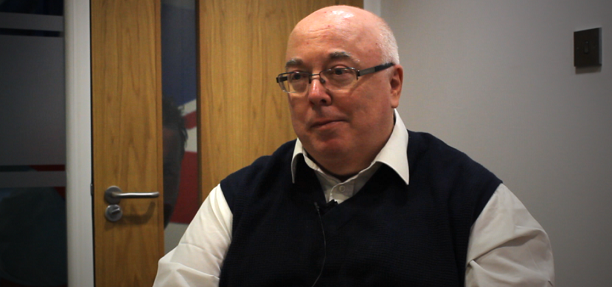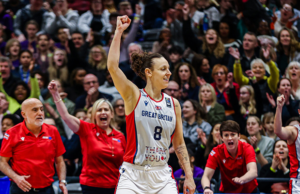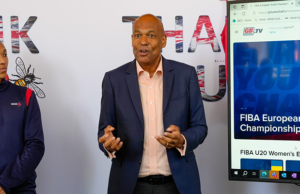Roger Moreland Speaks on UK Sport British Basketball Funding Cut


In the 20 minute interview, we discuss his initial reaction to the news, the implications for the future, what British Basketball are going to do next and much more.
The transcription can be found below the video, for all those who prefer to scan. Have a watch/read, and let us know your thoughts in the comments below.
Full interview transcription:
Hoopsfix(H): Let’s just start and rewind to yesterday, where were you when you heard about the funding and what was your initial reaction?
Roger Moreland (RM):I was here in the UK Sport offices because the British Basketball offices ironically located in UK Sport’s offices. Initial reaction was one of complete and utter shock because that was the first time the message had been transmitted and in fairness to UK Sport they kept that message pretty tight. Not even the people who deal with the sports day to day were told about the decision and I just felt, you know, such a dramatic decision, such a devastating decision, I just thought it could have been managed in advance of yesterday, quite frankly.
H: Now 24 hours later, you’ve had a bit of time to sit and reflect on it, have your feelings changed at all?
RM: No, not one iota. If anything I’m probably angrier. Yesterday was one of shock and the initial reaction was we’ve got to get the message out about what we feel about this situation. It’s one of anger. There’s been a lot of media coverage over the last 24 hours and we’ve been thinking about that, getting the message out. Thinking about what we need to do to make the appeal that we will make to UK Sport and also looking at what type of campaign can we also kick off to keep this media momentum going but also to make the case, and I suppose, look at alternatives if that turns out to be the case because we’re not going to go away, we’ve got two European Championships next year if people think we’re going to go away from that, then they’re crackers.
H: What does this actually mean? What does zero funding mean, what are the real world implications to British Basketball as an organisation?
RM: Well, they’re pretty devastating. They’d be devastating for any organisation where 80%+ of its revenue comes from that one source. It wasn’t at all what we anticipated because we were originally funded in the lead up to London as a sport with medal potential and there was never any suggestion it was just about London. Anybody that would’ve thought that would’ve been out of their minds quite honestly. It was longer term medal potential, and that’s what we were looking at Rio for and being able to demonstrate that we have the opportunity to qualify in our own right.
And had UK Sport said to you at any point in the last four years that it was going to be for longer than four years, or was there just a natural assumption from you that it was going to be?
RM: Initially when we got the awarding in 2009 we weren’t awarded world class performance funding, we were awarded funding from what then I think was called the development programme. It was because of the development potential of the sport and its profile in terms of the latent talent that’s in it, where it’s played, it’s participation numbers and the demonstrable ability to be able to compete at the top level. So there was never any suggestion…and I don’t think that was the case for any of the sports, I know it wasn’t in talking to colleagues in other sports. There was no suggestion funding was for four years and that was it.
H: And playing devil’s advocate a little bit, the criteria for UK Sport funding is very clear, they’re all about medals, that’s all that matters to them; it’s all about winning. On that basis, why didn’t we see it coming that it was going to be cut?
RM: Well we always knew we were on the cusp, we always knew we were on the cusp of that. But they had an 8-tier categorisation of what they would fund and we always thought, if we had a quarter finals place then that obviously would’ve helped our case. But you know, there are small margins in sport, a one point loss to the Spanish on the men’s side, silver medallists, a one point loss to French on the other side, those small margins make a huge difference. A couple of things either way, the only really bad half of basketball was the one against Australia on the men’s side and everybody accepts that. But hey, this is the same as somebody falling off their bike on the way around the velodrome – if Chris Hoy falls off his bike he doesn’t get a medal. So, you know, of course we knew that but we were a development sport with medal potential, that’s what we thought.
H: Do you think at all, that other factors played a role (in the funding cut). Maybe politics, you want to look at the backgrounds of different people in certain high positions, we don’t benefit from a basketball culture and an old boys network, if you want to call it that, of people in high places that have got a basketball background that are rooting for us. Do you think that plays a role in this decision?
RM: I don’t know. Maybe. I think it’s probably somewhat more complex in the sense that, you’ve just talked about Sam, the medal winning mentality, what it appears is, you go from that to the grassroots and talent development at home country level. Sport England on Monday announced that England Basketball would have £1.5million over four years, the gap between that type of development which is largely for young players, and what’s required to win medals is therefore huge. So what is there behind there that supports a sport like basketball, which in fairness ,is probalby one of a few that can say this, we’ve achieved, we’re at a certain level in our sport, going backwards is a real difficult option, but what is there in that gap there when you’ve made such big strides, and you’re not quite on the verge of winning medals but you can realistically qualify for the next Olympics and depending on the draw, who knows?
H: Talking in the future. There’s obviously this merger happening, what does it mean for the merger, how does it effect England Basketball and Basketball Scotland coming together and unifying under the Great Britain…
RM: It’s important to acknowledge that it’s not a merger, you’ve got to think about it as a confederated approach. And what that means is, it’s really about who is the member of FIBA. As far as that’s concerned, the agreement is in place with FIBA and the home countries are talking about how that works over the next three years before the papers have to be put into FIBA to create Britain as the member body. There’s an agreement in place and we’re working through that with FIBA and the other home countries at the minute. The home countries will remain, they will be responsible for the grass roots of the sport and talent development at the young levels with Britain being the member and they’ll be the members of FIBA through Great Britain. It’s just imporant to be clear about the fact it’s not a merger, those bodies stay but they confederate and the membership changes from home countries to Britain.
H: Ok so worst case scenario, you’ve said that 80% of your funding comes from UK Sport, if an appeal isn’t successful, where does that leave us, where are we going to get the money from, how are we going to survive, what’s going to happen?
RM: Well that’s the second part of the approach, and it’s quite interesting the responses we’ve had from partners, sponsors etc, is that we have their support. Now what we’ve got to do is mobilise that and see how we can generate as much revenue as possible for the future. Like all organisations you operate a reserves policy, so we have reserves which would enable us to achieve our immediate objectives which would be to compete in both the men’s and women’s Eurobaskets this year.
H: So you have got enough funding to last at least 2013 through with those European Championships commitments?
RM: Yeah, the question is, what can we deliver with the funding, because it’s by no means the level of funding that we would normally anticipate to operate in the way that we have been up until now. But it is an operating reserve and in the time we’ve had so far, we’ve made a commitment as board to say we want to continue for the men to play in Slovenia for the women to play in France and we’ve just got the look at what that means as far as revenue is concerned, how can we generate more revenue. It’s a difficult challenge, but we’ve got to do that, the sport in this country needs that in some way or another and maybe it just provides that reason to get behind something. The teams have got to a place that hopefully everybody can be proud of and hopefully that will provide a unifying cause.
H: Do you think that it could be argued that when you first got the funding you know it was for four years, you weren’t told that it was definitely going to be for longer than that, do you think it could be argued that in those four years you could have done a much better job of making British Basketball a commercially viable enterprise through privately sourced income and sponsorship, more to the point so that now you wouldn’t be reliant on 80% of your funding from UK Sport?
RM: There’s no sport, even what you might call the more commercial ones, that doesn’t rely heavily on the public purse. Of course we want to be commercially independent, but frankly, there are very very small number of sports that are commercially independent, and we’re probably not mature enough to be commercially independent at this point in time. The other thing to remember is that the British Basketball operation is extremely lean and very focused on the sport and the operations of the teams. It does not have a big operation in the background, we’ve done very well and in comparison to other sports, with the commercial funding that we’ve generated through this Olympiad.
H: There’s been a lot of complaints from fans of wastage and overspending over the last four years, do you feel like that’s a fair assumption, or not?
RM: Absolutely not. We’re given funding from UK Sport for a particular purpose, and we have to use it for that particular purpose. They don’t say “here’s a load of money”, we have to put in very detailed business proposals to justify the level of funding that we get. So I’m not sure what people are referring to when they talk about overspend or not managed pockets, if it gives people assurances, it’s a very bureaucratic thing to refer to, but we get the top rating we can possibly get from external and internal auditors. There’s never been any suggestion from UK Sport that we’re spending money in the wrong way, it’s actually directed in the right way from their point of view.
H: UK Sport has said that 2012 in a way was a bit of an anomoly because of the fact it was a home Olympics, and as a result of that, sports such as basketball actually got funded where under normal circumstances they would have never received funding in the first place. Should we just be grateful we got the last four years and move on?
RM: I suppose you might legitimately say yes to that if the teams didn’t achieve the competitive status that they did. What we’ve got to remember is that unlike any other sport, our host country place wasn’t given to us for any old reason. As we know, there was the Back British Basketball campaign that you were involved with for example, that was a big, big mobilisation to persuade people both off the court and on the court that we were worthy of the place. It wasn’t given to us for nothing. And we certainly never received the message…it probably would have been more helpful if it was said to us at the time, “Actually, this is only for London”, but we’ve never heard that message.
H: And if you had receieved that message, looking back now, what would you have done differently, if anything?
RM: I don’t know if we would have done anything different, but I think what we would have done if we had heard that message is to say, ‘well ok, that is your view, but what achievements would we have to achieve if that was the case’. I don’t think that’s a reasonable message for anyone, just no motivation or inspiration behind that, and I think one of the things we tried to do over the last 5 years is to provide an inspiration to the next generation of players. And that for me is the big thing about this funding decision. Basically is largely founded in the inner cities, it’s not like other sports in that respect; boxing is probably the only comparator I would think, in the Olympic sports to be quite frank. What about the inspiration and aspiration for the next generation from the inner cities who love basketball?
H: What do you think the message is from this funding cut for all the club coaches, volunteers, people that have grafted hard at the grassroots level for the last 10/15/20 years, only to see at the opposite end of the spectrum your funding completely cut? What do you think that message is from UK Sport?
RM: I think every sport needs to have something that people are aiming at. If you’re a kid in the street…you know, when I was a kid, I wanted to be Joe Royal, I was a big Everton fan. You need something to aim at. I think there’s loads of kids out there from the non-traditional UK Sport funded communities and sports, that frankly, if this is retained, then there’s a piece of inspiration and peice of aspiration and a dream possibility that’s been taken away from them.
H: All that legacy stuff seems like a bit of a…
RM: At the moment it seems a bit hollow, yes.
H: Talking about the appeal, what is the basis of your appeal going to be and do you know what the process is – how long it’s going to take, when we’ll hear whether a decision’s been made on that appeal?
RM: We’re looking into that at the moment. I think from a UK Sport perspective, one of the things we’re discussing with them is something additional to the appeal process which is more formal and on their website. What we’d like to do is have an opportunity to go infront of the UK Sport board. The UK Sport board works at a strategic level, it is provided with information and it makes decisions – not on what the sport has achieved, they don’t get that level of detail I don’t think. We want them to understand the passion behind the sport, the aspiration behind the sport, where it has come from and where it wants to go to. We want them to understand that basketball wants to win medals in the future at major championships, including the Olympic games. Six or seven years ago, people said ‘you’re not good enough to be at the Olympic games’, six or seven years ago, people were thinking we’d never make a European Championships; that’s what dreams are made of.
H: As devastating as this news is, is this potentially an opportunity for a huge overhaul and almost a turning point for us to say what do we need to make this sport work, what do we need to do to make the government and UK Sport and whoever else take this sport seriously that is loved by so many young kids and be that turning point that in 10, 15, 20 years, we look back and say maybe this was actually the kick in the arse we needed to make it work?
RM: For me, getting in on 40 years in the game, I’ve heard this on so many occasions, that basketball doesn’t do itself any favours because there’s lots of factions within basketball fighting with one another. I think, iF anything comes out of this, for there to be one clear unified campaign to support what basketball wants and that’s GB teams to compete at the highest level of the game in this particular case. That could be a unifying effect that goes through the sport. I’d make an appeal to everyone involved, hopefully we’ll find methods and opportunites to be able to express that view and I’d encourage everyone to join in with that. I’ve even had emails this morning from secondary schools where the PE departments have said our basketball players are so upset about this they want to start a petition, can we get other schools to join in with this. That’s the type of thing that if we can provide that sort of opportunity in some way or another and keep the momentum of…ironically, we’ve probably had more media coverage in TV and the mainstream sports pages over the last 24 hours, which is really ironic. Basketball is in the picture, and yet it’s for this reason.
H: Right now as it stands, you’ve got about a year with the funding that you have – the current funding cycle ends in April , is there a possibility you have to look at everything now and say maybe we’re gonna have to lay off staff, cutback a lot…
The worst case scenario is what have we got to operate from reserve and what does that mean if we want to realise our ambition of fulfilling the places at Eurobaskets in the coming year?
H: Because there is so little money, should we say goodbye to our NBA players, Luol and Joel Freeland now and all our top players playing for the GB team?
RM: All I can say to that is, I hope not. It’s impossible for me to say. Lu was playing last night, we’re in dialogue with Lu etc. But I know how committed those guys are, and I really hope it’s not about that but we’ll just have to see how resource and other logistics and everything else fits in as the picture becomes a little bit clearer in the early part of next year I guess.
H: I know that your job as a federation is for the high performance end of the scale, but do you think there could have been a greater commitment to youth so that in the next two cycles, but 2020 we’ve got more of the top young British talent coming through?
RM: There are tremendous talent programmes in England and Scotland using the funding that is provided by the respective sports councils. Basketball Wales doesn’t have that same funding – they don’t get supported by Sport Wales. The talent programme has been recognised by a £1.5million award on Monday this week to England Basketball by Sport England, but you can see, £1.5million over four years, it’s not a great deal of money. Again, you come back to the point that the pathway is a unified thing and the issue now is, if a pathway is going to provide motivation beyond the amount of funding available, it needs to be complete. The question is now, it doesn’t feel as complete as it did do on Monday.
H: On that same basis, one of the key things you’ve been doing is the Regional Institues of Basketball, you’ve obviously got the one at Barking Abbey, what does it mean for them? I know you had plans for more in the future dotted around the country, are they going to have to be re-evaluated now?
RM: I think it’s more the system than anything else. Barking Abbey has not relied on British Basketball or England Basketball to do what its achieved, same with other places around the country; the question with regional institutes is can it build upon what’s already there really, in the right places. So I suppose it’s taking the added value and what does it do to that added value and again, it’s probably too early to say what the impact will be. Clearly, a loss of that amount of funding means it’s going to be really difficult to manage, particularly when you get to the U20 level and beyond and the develpopment programmes, we’ve got to really take stock of what we can do with the resources available and not pretend the loss of resource means you can provide the same amount of opportunity.
H: So, to finish I guess. What is the future for British Basketball?
Unclear at the moment, but we’re not going away. Whatever happens, we need to build through the age group programmes, that’s really essential. That means we may have to redesign the way that we approach it, we may have to look at what other opportunities are available to us through other partnerships and networks. Very often if you lose money or you have less money, a lot of innovation comes out in those times so it will be fasinating to see how it reveals itself for basketball going forward.






26 Comments